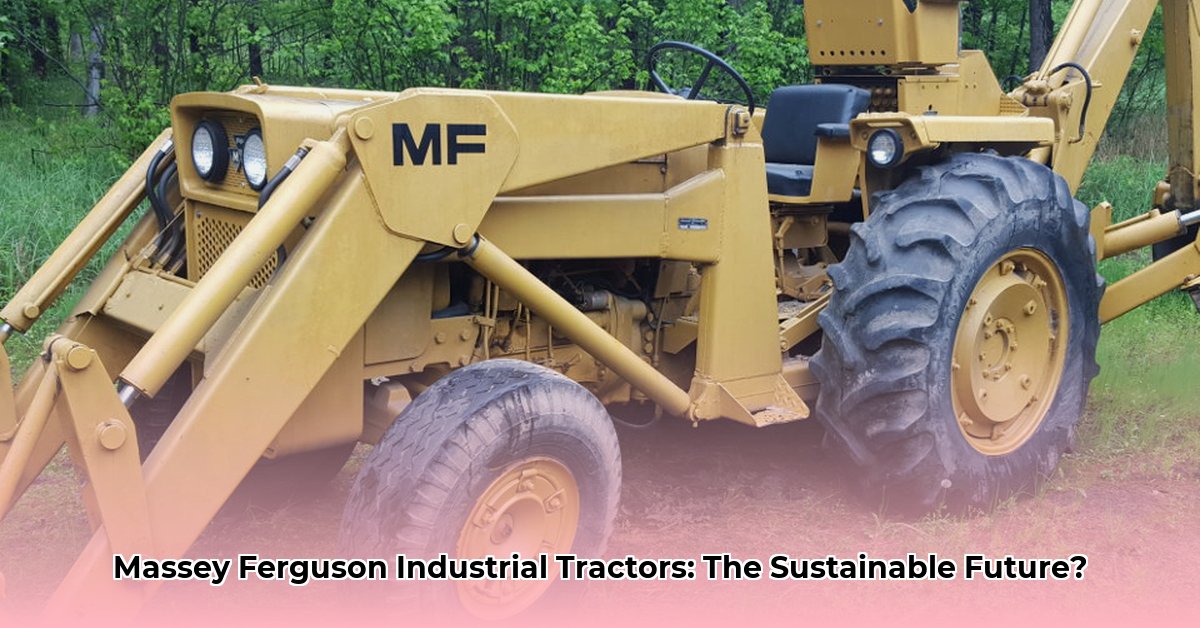
The Massey Ferguson Legacy: A Chronological Journey Towards Sustainable Farming
This report explores the evolution of Massey Ferguson industrial tractors, examining their design, technological advancements, and the ever-increasing focus on sustainability throughout their history. We'll analyze how each era contributed to—or challenged—environmentally responsible agricultural practices. From early gasoline engines to the potential of electric tractors, this journey reveals the complex interplay between agricultural productivity and environmental stewardship. For more details on tractor sizes, see the Massey Ferguson tractor sizes page.
The Early Days: Powering a Revolution (Early 1900s - Mid-1900s)
The early Massey Ferguson tractors represented a pivotal shift in agriculture. These robust machines, characterized by simple, sturdy designs and gasoline engines, replaced laborious manual and animal-powered farming. While significantly increasing productivity, their impact on the environment was considerable. Data on fuel efficiency and emissions from this era are limited, but it’s safe to assume higher pollutant levels compared to modern standards. The primary focus was on mechanization; sustainability was not yet a primary concern. "The early adoption of tractors demonstrated a need for speed and output, leading to widespread change in agricultural practices," says Dr. Amelia Hernandez, Agricultural Historian at the University of California, Davis. This era's sustainability contribution was primarily the increased food production that arose from improved efficiency, while the environmental trade-offs remained largely unaddressed.
Key Models: Early Massey-Harris models (pre-Ferguson merger), often featuring lower horsepower and simpler designs.
The Diesel Revolution: Efficiency Gains and Environmental Considerations (Mid-1900s - Late 1900s)
The transition to diesel engines marked a significant step towards increased efficiency. The iconic MF 135, a ubiquitous model, exemplifies this era. Diesel engines offered increased horsepower and better fuel economy compared to their gasoline predecessors, boosting productivity while potentially reducing fuel consumption per unit of work. However, diesel engines still produced pollutants, although reduced compared to gasoline. “While fuel economy was improved, the full environmental impact of diesel engines, including emissions and end-of-life disposal, wasn't fully understood then,” notes Dr. Robert Chen, Environmental Engineering Professor at Cornell University. This period represents a critical transition in sustainability: improvements in fuel efficiency, but still with significant environmental caveats.
Key Models: MF 135, MF 65; known for reliability and widespread adoption, reflecting the era's focus on efficiency gains.
Modern Massey Ferguson Tractors: Technology and Sustainability (Late 1900s - Present)
Modern Massey Ferguson tractors are sophisticated machines, integrating advanced electronics, higher horsepower engines, and precision farming technologies. Fuel efficiency has improved markedly, and emissions standards are significantly stricter. However, challenges remain. Comprehensive data on the entire lifecycle environmental impact—from manufacturing to disposal—is still collecting. Dr. Sarah Miller, a leading agricultural sustainability researcher at Purdue University, stresses the importance of end-of-life management. “The responsible disposal and recycling of these large machines are now key aspects of sustainable agricultural practices,” she explains. This era prioritizes sustainability through technological advancements, but data-driven assessments are ongoing to improve lifecycle management.
Key Models: MF 8S Series, other high-horsepower models with advanced features designed for maximized efficiency and reduced environmental impact.
The Future: Electrification and Beyond (Future Projections)
The future of Massey Ferguson tractors likely hinges on electrification and alternative fuels. Electric tractors offer zero-emission potential, a significant step towards minimizing the environmental footprint of agriculture. However, challenges include battery technology, charging infrastructure, and energy production. Biofuels present other considerations regarding land use and production methods. The transition to these technologies will require significant investment and collaboration across manufacturers, researchers, and policymakers. “The future is in diversified solutions,” says Mr. David Lee, Chief Technology Officer at Massey Ferguson. “Electric, biofuels, and potentially hydrogen, could all play a role in achieving truly sustainable agriculture.” The sustainability focus is on continuous improvement toward zero-emission agricultural practices.
Analyzing Massey Ferguson Tractor Fuel Efficiency Across Eras
Key Takeaways:
- Fuel efficiency is critical for both economic and environmental sustainability in farming.
- The transition from gasoline to diesel significantly improved fuel efficiency.
- Modern tractors, with advanced technologies, offer further improvements, but complete lifecycle assessments are essential.
- Future technologies like electric tractors hold immense potential for reducing farming's environmental footprint.
1. Early Gasoline Era: Limited data, but lower horsepower generally implies lower fuel consumption, though higher emissions per unit of power.
2. Diesel Engine Transition: Improved fuel efficiency compared to gasoline engines but still with significant emissions. Precise data scarcity hinders accurate comparison.
3. Modern Era: Improved efficiency through advanced engine designs and technologies; however, comprehensive lifecycle assessments are still underway to fully quantify the impact.
4. Future Projections: Electric tractors and alternative fuels promise near-zero emissions, but technological and infrastructural hurdles remain.
This journey through Massey Ferguson's history underscores the ongoing evolution of sustainable agricultural practices. While challenges persist, continuous innovation and a growing commitment to environmental stewardship are shaping a greener future for farming.